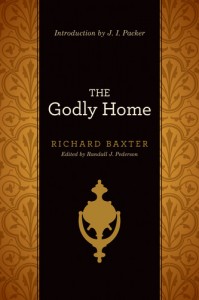 Richard Baxter was a minister in England in the seventeenth century. I’m slowly reading through his book The Godly Home, which was reprinted in that last couple years and updated some for modern readers. Basically, it is a remarkably up-to-date and relevant manual for thinking about and building a Christian home. Only a few of us in the young adults group are married, but admit it–all of us are thinking about it. Which means, we should be thinking about the kind of home God wants us to build. So I recommend the book.
Richard Baxter was a minister in England in the seventeenth century. I’m slowly reading through his book The Godly Home, which was reprinted in that last couple years and updated some for modern readers. Basically, it is a remarkably up-to-date and relevant manual for thinking about and building a Christian home. Only a few of us in the young adults group are married, but admit it–all of us are thinking about it. Which means, we should be thinking about the kind of home God wants us to build. So I recommend the book.
It’s full of wisdom like this section below, which helps us think through the benefits of a cultivating a godly home from (what I found to be) a slightly unexpected angle. Please don’t read this as harsh, but rather, being said bluntly with some old language, as a real appraisal of the different kinds of homes parents help build–and as a charge to build the first kind.
A holy, well-governed family tends not only to the safety of the members but also to the ease and pleasure of their lives. To live where God’s law is the principal rule and where you may be daily taught the mysteries of his kingdom and have the Scriptures opened to you and be led, as by the hand, in the paths of life, where the praises of God are daily celebrated and his name is called upon and where all speak the heavenly language and where God, Christ, and heaven are their daily work and recreation, where it is the greatest honor to be most holy and heavenly, and the greatest contention is who shall be most humble and godly and obedient to God and their superiors and where there is no reviling scorn at godliness, nor any profane and coarse language – what a sweet and happy life this is! It is the closest thing to heaven on earth.
But to live where worldliness, profaneness, wantonness, and sensuality bear all the sway and where God is unknown and holiness and all religious exercises are matters of contempt and scorn and where he who will not swear and live profanely makes himself the hatred and derision of the rest and where men are known by their shape and speaking faculty to be men – nay, where men take not themselves for men but for animals and live as if they had no rational souls or any expectations of another life or any higher employments or delights than the transitory concernments of the flesh – what a sordid, loathsome, filthy, miserable life is this! To live where there is no communion with God, where the marks of death and damnation are written, as it were, upon the doors, in the face of their impious, worldly lives, and where no man understands the holy language and where there is not the least foretaste of the heavenly, everlasting joys – what is this but to live as the serpent’s seed, to feed on dust, and to be excommunicated from the face and favor of God and to be chained up in the prison of sexual desire and malignity among his enemies until the judgment that is making haste comes and will render to all according to their works.
